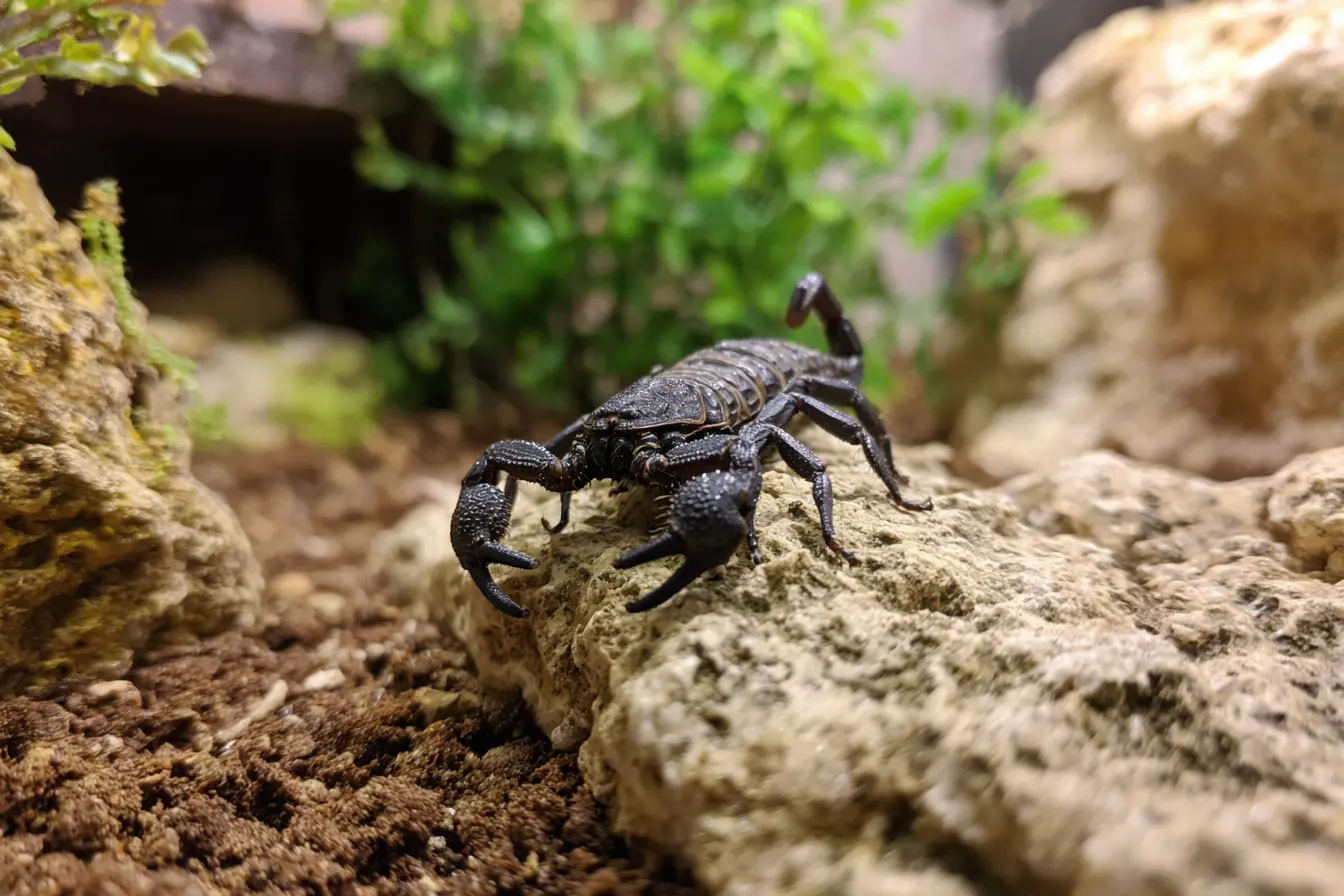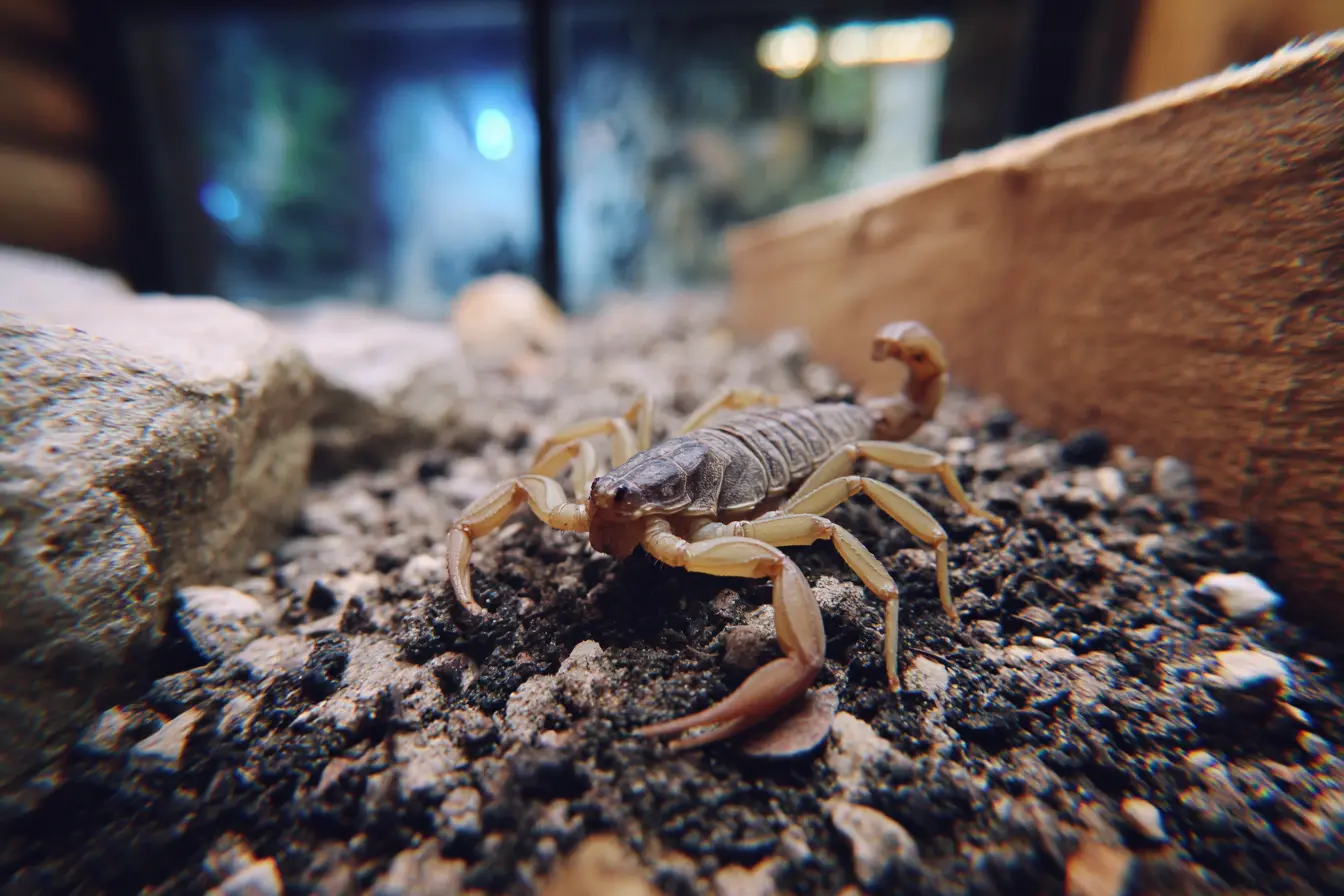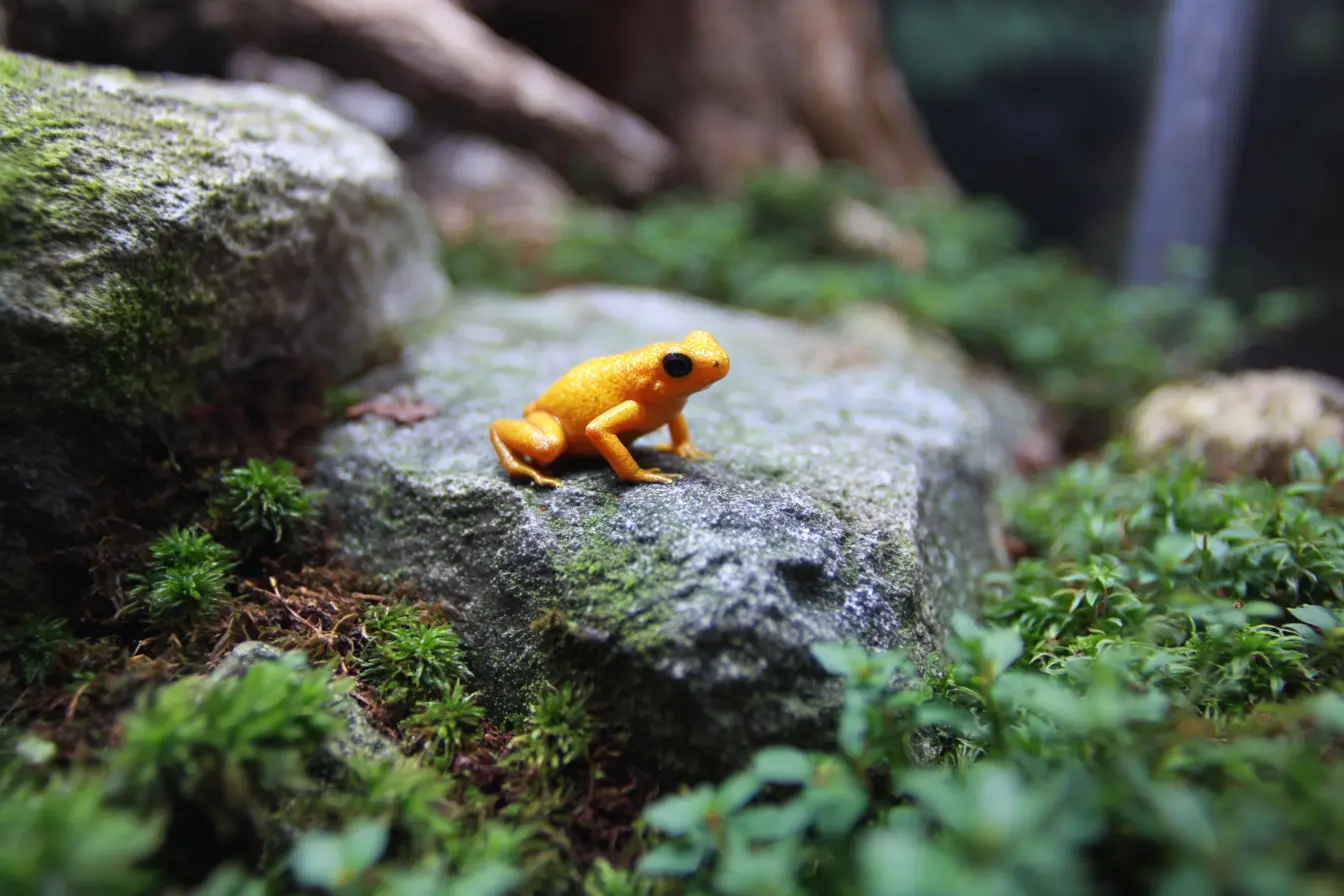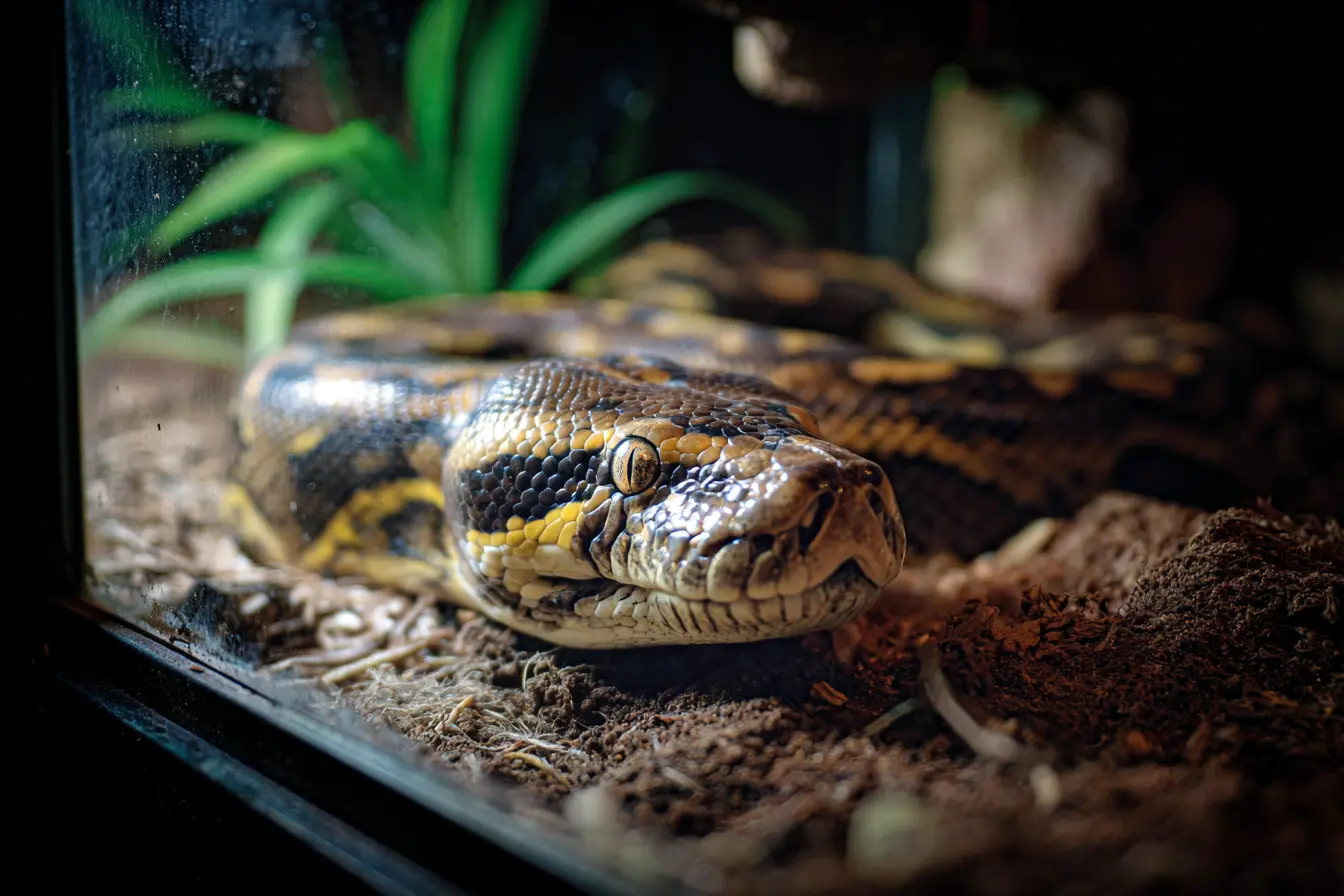
The Complete Guide to Keeping Banded Flat Rock Scorpions
The Banded Flat Rock Scorpion (Hadogenes paucidens) is one of the largest scorpion species in the world and a favourite among exotic invertebrate keepers. Native to the rocky hills and savannahs of southern Africa, this impressive scorpion is celebrated for its striking banded appearance, calm temperament, and long lifespan.
This guide covers everything you need to know about keeping, feeding, and breeding the Banded Flat Rock Scorpion to help it thrive in captivity.
Why Keep a Banded Flat Rock Scorpion?
The Banded Flat Rock Scorpion is an ideal choice for scorpion enthusiasts of all experience levels.
- They have a calm and tolerant nature, making them easy to observe.
- Their large size and banded colouring make them visually striking.
- They require minimal maintenance and adapt well to captivity.
- They are hardy and long-lived compared to many other invertebrates.
- Their impressive appearance is sure to be a talking point in any exotic pet collection.
Quick Facts
- Scientific Name: Hadogenes paucidens
- Origin: Southern Africa (South Africa, Zimbabwe, Botswana)
- Size: Up to 18–20 cm (7–8 inches)
- Lifespan: 8–10 years in captivity, with females sometimes living even longer
- Temperament: Calm and docile, rarely aggressive
- Venom: Very mild, considered harmless to humans
- Diet: Insectivorous, feeding on appropriately sized live insects
Choosing and Acquiring a Banded Flat Rock Scorpion
Banded Flat Rock Scorpions are often available from specialist breeders or exotic pet suppliers. When choosing a scorpion:
- Select a healthy individual with a full body and active movements.
- Avoid scorpions that appear lethargic, underweight, or have damaged limbs.
- Captive-bred specimens are preferable, as they are healthier and more ethically sourced.
Housing and Enclosure Setup
Creating a proper enclosure will help your scorpion thrive and display natural behaviours.
Enclosure Type
- A secure plastic or glass terrarium is suitable.
- Good ventilation is essential, as they prefer dry environments.
Enclosure Size
- Due to their large size, adults should have at least a 60cm x 30cm x 30cm enclosure.
- A horizontal setup with ample floor space is recommended, as these scorpions are not climbers but enjoy exploring.
Substrate
- Use a mixture of dry sand and clay, or desert-specific substrates, to mimic their natural habitat.
- The substrate should be firm enough to support burrowing under rocks.
Hiding Areas
- Provide plenty of flat rocks, slate pieces, and bark for hiding and exploration.
- Creating crevices and tight spaces will allow the scorpion to feel secure.
Temperature and Humidity
- Keep daytime temperatures between 26°C and 32°C, with a slight drop at night.
- Humidity should be kept low, around 30%–40%.
- Misting is generally unnecessary, but a small water dish should be provided.
Lighting
- No special lighting is required, and they do well with ambient room light.
- Avoid direct sunlight, which can cause overheating.
Feeding and Nutrition
Banded Flat Rock Scorpions are opportunistic insectivores and thrive on a diet of live prey.
Suitable Prey
- Crickets, locusts, mealworms, and dubia roaches are excellent choices.
- Prey should be appropriately sized, roughly half the length of the scorpion’s body or smaller.
Feeding Frequency
- Adults can be fed once every 7–10 days.
- Juveniles may need feeding twice per week.
Feeding Tips
- Remove uneaten prey after 24 hours to avoid stressing the scorpion.
- Gut-load feeder insects to ensure better nutritional value.
- Occasional fasting is normal, especially during moulting periods.
Water
- A shallow water dish should always be available, cleaned and refilled regularly.
Handling a Banded Flat Rock Scorpion
Banded Flat Rock Scorpions are among the calmer scorpion species but are still best observed rather than handled.
- Handling is not recommended as they can be easily injured due to their heavy body and fragile limbs.
- If enclosure maintenance is required, use soft brushes or catch cups to gently guide them away from your hands.
Moulting and Growth
These scorpions grow slowly and have fewer moults compared to smaller species.
- Moulting occurs less frequently in adulthood and can take several years between moults.
- Signs of moulting include decreased appetite, sluggish behaviour, and dull colouration.
- Ensure the scorpion is left undisturbed during this time and provide extra hiding spaces.
Breeding Banded Flat Rock Scorpions
Breeding is possible but may require patience due to their slow reproductive cycle.
- Males are more slender with longer tails and pectines (sensory organs), while females are broader and stockier.
- Courtship involves the male guiding the female over a deposited spermatophore.
- Females may give birth to live young after several months of gestation.
- Provide plenty of space and hiding areas to reduce stress during mating.
Common Health Issues
Dehydration
- Indicated by lethargy and a wrinkled body. Provide clean water at all times.
Injury
- Rough handling or enclosure hazards can lead to broken limbs. Minimise handling and provide secure hides.
Failed Moults
- Usually caused by poor humidity or stress. Ensure hiding spots and a stress-free environment, even in low-humidity setups.
Obesity
- Feeding too frequently can cause overweight scorpions. Stick to a regular feeding schedule and avoid overfeeding.
Ethical Considerations
- Always choose captive-bred individuals to protect wild populations.
- Avoid overhandling and provide a naturalistic setup that allows the scorpion to display normal behaviours.
- Never release captive scorpions into the wild.
Legal Considerations in the UK
- Banded Flat Rock Scorpions are legal to keep in the UK and do not require a licence.
- Ensure your scorpion is ethically sourced and complies with exotic pet regulations.
Final Thoughts
With their impressive size, calm nature, and low-maintenance care, the Banded Flat Rock Scorpion is a fascinating addition to any invertebrate collection. Ideal for beginners and experienced keepers alike, they offer a unique opportunity to observe the slow, deliberate movements and natural behaviours of one of the world’s largest scorpion species.
Contents
- Why Keep a Banded Flat Rock Scorpion?
- Quick Facts
- Choosing and Acquiring a Banded Flat Rock Scorpion
- Housing and Enclosure Setup
- Feeding and Nutrition
- Handling a Banded Flat Rock Scorpion
- Moulting and Growth
- Breeding Banded Flat Rock Scorpions
- Common Health Issues
- Ethical Considerations
- Legal Considerations in the UK
- Final Thoughts
Tags
Vets near you
Speciality vets
- Aquatics vet specialists
- Birds vet specialists
- Camelids vet specialists
- Cats vet specialists
- Cattle vet specialists
- Deer vet specialists
- Dogs vet specialists
- Equines vet specialists
- Exotic vet specialists
- Goats vet specialists
- Pigs vet specialists
- Poultry vet specialists
- Sheep vet specialists
- Small Mammals vet specialists
- Wild vet specialists
Vet facilities
- Accessible by public transport
- Blood testing
- Car park nearby
- Client car park
- Dentistry
- Diagnostic imaging
- Disabled public access
- Flea and worm treatments
- Microchipping
- Mobile services
- Neutering
- Open at weekends
- Out-of-hours service
- Referral interests
- Referrals only
- Street parking outside
- Toilets available
- Vaccinations



